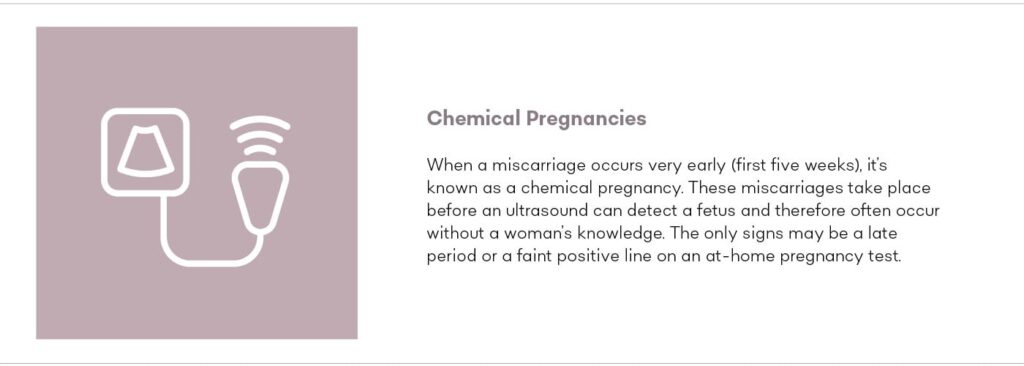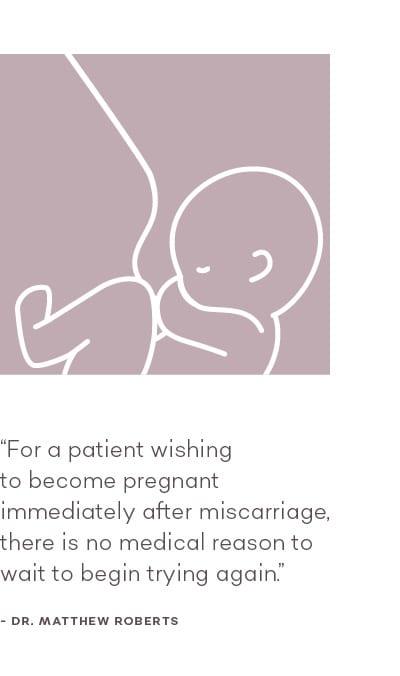For those who are pregnant or trying to conceive, concerns about the possibility of miscarriage are understandable.
After all, miscarriages are rather common. But the fact that many women experience them doesn’t make the loss any easier.

Miscarriages are more common than most people realize. In fact, anywhere from 10-25% of pregnancies end in miscarriage, though most happen before a woman even discovers she’s pregnant. For those that occur after a woman has learned she’s pregnant, it can be heartbreaking. If you’re pregnant or trying to conceive, here’s what you should know.
What Is a Miscarriage?
The term miscarriage is commonly used, but you may also have heard the phrase early pregnancy loss. Both are used interchangeably and refer to the spontaneous loss of a pregnancy before 20 weeks. An overwhelming majority of miscarriages occur during the first trimester, which explains why people tend to wait until 13 weeks to tell others they’re pregnant.
Miscarriages are most commonly caused by chance abnormalities in chromosomes. In fact, they explain about half of early pregnancy losses. As the embryo divides and grows, there may be missing or extra chromosomes that prevent a viable pregnancy. These abnormalities are often random and are not attributed to either parent.
There are additional underlying issues that can lead to miscarriages, though. Hormone imbalances are linked to about 15% of early pregnancy losses. For example, polycystic ovary syndrome can result in elevated androgen hormone levels that form cysts and impair the regular function of the ovaries. Sometimes anatomy plays a part too. Just as the nose can have a deviated septum that obstructs air flow, the uterus can have a septum that divides the uterus and prevents fetal development.
Chronic illnesses such as unmanaged diabetes and autoimmune diseases like lupus are other contributing causes. Even advanced maternal age can increase a woman’s risk of miscarriage, from 20% at age 35 to 40% at age 40 and 80% at age 45.

The Blame Game
Women tend to blame themselves, but in most instances, your lifestyle does not cause a miscarriage. “Intrauterine devices or birth control pills do not cause miscarriage, nor does emotional stress, physical stress like lifting something heavy, or exercise,” explains Dr. Linda Yu, an OB-GYN at Erlanger Health System. “Continuing with a healthy exercise regimen is actually very healthy for pregnancy.”
There are, however, some behavioral risk factors to avoid or be cautious of when trying to conceive. Drinking, smoking, and drug use can increase the chances of miscarriage. Being underweight or overweight has also been linked to an increased risk. Eating undercooked meats, raw eggs, and unpasteurized dairy products can expose you and your pregnancy to listeria, a harmful bacteria. “Pre-pregnancy counseling with your provider can help identify health risks that may be able to be reduced prior to attempting pregnancy,” says Dr. Yu.
What You Should Look For
“An early pregnancy loss may be quite obvious and manifest like a smaller version of labor. Other times it can be easy to miss, instead appearing similar to a woman’s normal menstrual discharge,” explains Dr. David Barker, OB-GYN with the OBGYN Centre of Excellence. Every experience is different.
The most common symptom of early pregnancy loss is bleeding. Small amounts of bleeding or spotting can be relatively common during the first trimester and are typically no cause for concern. However, it’s important for you to share symptoms with your doctor so that he or she can confirm everything is progressing as it should be. Bleeding later in pregnancy can be more serious and should be assessed immediately.
Symptoms similar to menstrual aches could also be signals. Mild to severe cramps, including pain in the abdomen and back, may be signs of miscarriage. Cramping may feel more pronounced like contractions as opposed to a dull throbbing. Passing tissue or sizeable clot-like material is another red flag.
If you experience any of these symptoms, contact your doctor immediately. He or she can conduct exams and tests to confirm whether a miscarriage has occurred or if there’s a different underlying issue.
If It Happens
Treatment options vary depending on the stage of pregnancy. “In some cases, when the pregnancy stops forming, the miscarriage occurs quickly,” says Dr. Barker. The earlier in the pregnancy you are, the more likely it is your body will rid itself of fetal tissue on its own. As you get further along, there are other options you may need to consider.
If there are no signs of infection, you may choose to let the miscarriage progress naturally. “This may take weeks or months,” explains Dr. Barker. “While some women can be patient this long, many will choose medical intervention.” Your doctor can prescribe medication to expel the pregnancy tissue and placenta after a pregnancy loss or recommend surgery.
“If the patient continues with bleeding and cramping, it could be a sign of an incomplete miscarriage, which often requires surgical intervention,” says Dr. Matthew Roberts, an OB-GYN with Associates in Women’s Health. “Signs of an incomplete miscarriage may be excessive bleeding – such as soaking two pads per hour – fever, chills, or severe pain or cramping,” he continues. During a relatively minor procedure known as a dilation and curettage (D&C), your doctor will remove the tissue from the uterus surgically.
Learning To Cope

A miscarriage can leave you feeling emotionally and physically overwhelmed – it’s important to take care of yourself on both aspects. Physical recovery generally takes a few hours to a few days. You may ovulate as soon as two weeks after a miscarriage, and your period can return four to six weeks after.
Emotional healing can take longer – give yourself time to grieve. “Women can experience a range of emotions during this trying time. Feelings of guilt, sadness, loss, and grief are all very common,” says Dr. Yu. “A woman should let her health care provider know if there’s significant grief or sadness lasting more than several weeks or interfering with daily activities. The loss of a pregnancy can cause depression, and it is important to stay in contact with your health care provider in case the need for counseling or medication arises.”
Moving Forward
Discussion may come up about when to try to conceive again. Put your mind at ease. If you feel mentally and emotionally ready, it’s possible you can try again very soon after a miscarriage. “For a patient wishing to become pregnant immediately after miscarriage, there is no medical reason to wait to begin trying again,” says Dr. Roberts.
The data is encouraging. Miscarriage is generally a one-time incidence. Even if you’ve had a miscarriage, the likelihood you’ll have a successful pregnancy is the same as anybody else’s. Many women fear that having a pregnancy loss predisposes them to further losses. However, less than 5% of women have two consecutive miscarriages. And only 1% of women have three or more consecutive miscarriages.
All hope is not lost if you experience multiple miscarriages. “If a woman experiences multiple, recurrent miscarriages, there is testing that can be done to try to diagnose a cause,” explains Dr. Roberts. Even without pinpointing a specific cause, about 60-80% of women with unexplained consecutive miscarriages go on to have healthy pregnancies.
Bottom line, you shouldn’t lose heart. Be kind to yourself as you heal from a difficult experience. With the proper care and support networks, you can move forward.

Dr. Matthew Roberts
OB-GYN, Associates in Women's Health

Dr. David Barker
OB-GYN, OBGYN Centre of Excellence

Dr. Linda Yu
OB-GYN, Erlanger Health System
